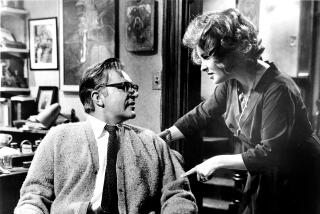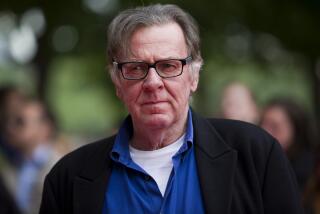William Woolfolk, 86; Novelist Wrote for Television, Comics
- Share via
William Woolfolk, an eclectic writer whose work includes novels, nonfiction books, Emmy-nominated television scripts for “The Defenders” and stories for comic book characters, including Captain Marvel and Blackhawk, has died. He was 86.
Woolfolk died July 20 in a Syracuse, N.Y., hospital of congestive heart failure.
The author’s 19 books of fiction and nonfiction sold more than 6 million copies and included eight Book of the Month Club selections. Yet he never became well-known in literary circles. Woolfolk, who sometimes wrote under pseudonyms, humorously attributed his anonymity to his remarkable versatility.
“No literary monuments have ever been erected that proclaim: ‘He was versatile,’ ” he once told the anthology Contemporary Authors. “No one looks forward to a new book by William Woolfolk because no one, including the author, knows what it will be.”
His early stories for comic books, he noted in an interview last year, “have outlasted my writing efforts in other media.”
Straight out of New York University, with a little seasoning in writing advertising copy, Woolfolk wrote stories in the early 1940s for comic book publishers Fawcett, Archie Comics, Quality, Timely (which became Marvel), National and DC. He zoomed to the top of the neophyte profession, earning $300 a week when the average weekly salary was about $30.
“Writing during the so-called Golden Age of comics, I soon became the best paid and most sought-after writer (there was little competition) in the field,” he told Contemporary Authors. “I wrote for all the characters now so nostalgically remembered: Captain Marvel, Superman, Batman, Captain Midnight, Blackhawk, Plastic Man and many others. This work paid so well, was so easy to do, and so much fun, that my versatility might have come to an end forever. But the Golden Age passed, and I moved on.”
Artist Lou Fine, who worked with Woolfolk in those years, called him “the Shakespeare of comics” for his action-packed stories, often involving superheroes thwarting Nazis.
Last year, Comic-Con International, a nonprofit that promotes comics and similar art forms, gave Woolfolk its Inkpot award at its San Diego convention. Previous winners include Mel Blanc, Edgar Rice Burroughs, Ray Bradbury and Bob Kane.
Although he never created new characters, Woolfolk is credited with giving Captain Marvel his oft-quoted expression “Holy Moley!” to denote astonishment.
Woolfolk served in the Army during part of World War II and then freelanced for several magazines, worked for the short story magazine Shock and founded O.W. Comics and Space World astronautics magazine.
He was lured into writing for television by his friend, Reginald Rose, author of the screenplay “Twelve Angry Men,” for the television series “The Defenders,” starring E. G. Marshall and Robert Reed as father and son lawyers. Woolfolk served as story editor for the show, which ran from 1961 to 1965 and dealt with controversial issues for its day. He also contributed several scripts; two of them -- “A Book for Burning,” about censorship, and “All the Silent Voices,” about birth control -- were nominated for Emmy Awards.
Woolfolk published his first novel, “The Naked Hunter,” in 1953 and a decade later switched to hardcover books with “My Name Is Morgan,” which was a Doubleday Book Club selection and a Literary Guild alternate.
His novels, which dealt with a broad range of subjects, were often thought to have been based on historical figures. “Maggie,” in 1971, for example, seemed to mirror the affair of newspaper magnate William Randolph Hearst and actress Marion Davies. “Beautiful Couple” in 1968 echoed the tumultuous Hollywood marriage of entertainers Elizabeth Taylor and Richard Burton. And “The Builders” in 1969, about construction of New York’s Seagram Building, included a character based on architect William Lescaze.
The author, harking back to his early years in the comic book industry, also wrote a novel derived from the television series “Batman” -- the 1966 book “Batman vs. Three Villains of Doom” -- and another from a Batman film -- the 1967 book “Batman vs. the Fearsome Foursome.”
Woolfolk wrote two major nonfiction books. The first, “The Great American Birth Rite” in 1975, was done with his former wife, Joanna Martine Woolfolk. Former Times book critic Robert Kirsch praised the book as “an ideal consumer’s guide” with a “sensible, factual approach ... matter-of-fact tone” and “careful research” about the high costs of rearing a child.
The second nonfiction book, “Daddy’s Little Girl: The Unspoken Bargain Between Fathers and Their Daughters” in 1982 was written with his daughter, Donna Woolfolk Cross, who is best known for her novel “Pope Joan.”
“A daughter is a father’s link to immortality,” he wrote in that book. “She is what he has contributed to the world.”
Woolfolk is survived by his daughter, of Syracuse; his stepson, Donald Woolfolk, of Williamsburg, Va.; and four granddaughters.
More to Read
Sign up for our Book Club newsletter
Get the latest news, events and more from the Los Angeles Times Book Club, and help us get L.A. reading and talking.
You may occasionally receive promotional content from the Los Angeles Times.









